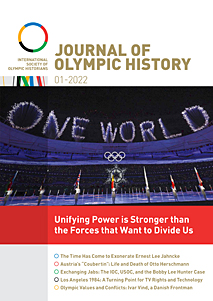 The 24 th Winter Olympic Games Beijing 2022 are history. IOC President Thomas Bach called them “truly exceptional” at the closing ceremony, which seemed to reflect the opinion of most of the athletes.
The 24 th Winter Olympic Games Beijing 2022 are history. IOC President Thomas Bach called them “truly exceptional” at the closing ceremony, which seemed to reflect the opinion of most of the athletes.
The COVID-19 pandemic forced these Games to be held in a bubble as well, which meant they lost a lot of their flair. Shadows were cast by discussions concerning human rights violations and increasing international tensions. Nonetheless, the Olympic Truce – which the United Nations member states committed to uphold at the General Assembly of 2 December 2021 – was upheld. Thomas Bach was able to confidently praise the Olympic participants following 16 days of competition with no conflicts: “May the political leaders around the world be inspired by your example of solidarity and peace.” Unfortunately, the applause promptly stopped when Russia attacked Ukraine just four days later.
The future evaluation of Beijing 2022 will be a challenge for Olympic historians – remaining factual and source-based as always. An example of this challenge is the article in this issue about the American Ernest Lee Jahncke, who was expelled from the IOC in 1936. This article was the last that Norbert Müller wrote; the 2019 ISOH laureate passed away during these Winter Games.
The fate of Otto Herschmann also documented in this issue, proves that Jahncke’s judgment of the Nazi regime and the opportunism of the IOC leadership at the time was justified. The Viennese Jew, who successfully participated in two Olympic Games as a swimmer and fencer and was hailed as Austria’s “Coubertin”, fell victim to the Holocaust.
The organisers wanted Munich 1972 to serve as a contrast to Berlin 1936. The Games began on a cheerful note but then took a tragic turn when Palestinian terrorists carried out an assassination attempt on the Israeli team. The 50th anniversary will keep us busy in the coming issues.
On this occasion, Stephen Wenn narrates the case of boxer Bobby Lee Hunter, who was sentenced to 18 years in prison for manslaughter and wanted to qualify for the 1972 US Olympic team. Pros and cons balanced each other out until the argument settled itself: Hunter lost in the Trials.
We can rave about the “good old days” when the Olympic Games cost a lot of money and brought in none. However, those who benefited from the liberalisation of the rules would do better to remain silent. In the fifth part of his series on Olympic TV, IOC Member Richard W. Pound expertly describes the year 1984, which marked a turning point for the Games.
The Dane Ivar Vind did not live long enough to see this development. He died in 1977 at the age of 56. Else Trangbæk and Søren Riiskjær present him as a supporter of sport’s autonomy and fair play and as an opponent of the political and commercial exploitation of the Games – as a figure who held Olympic values dear.
– Volker Kluge, Editor
Members of ISOH may view digital versions of all issues by clicking here.

There are no comments published yet.